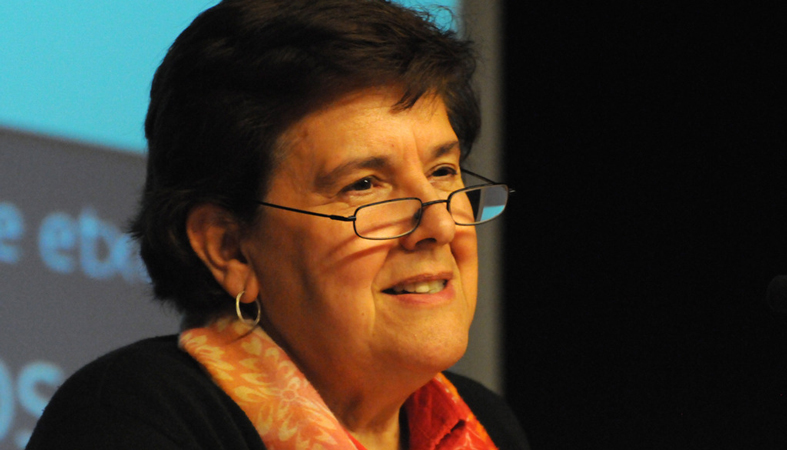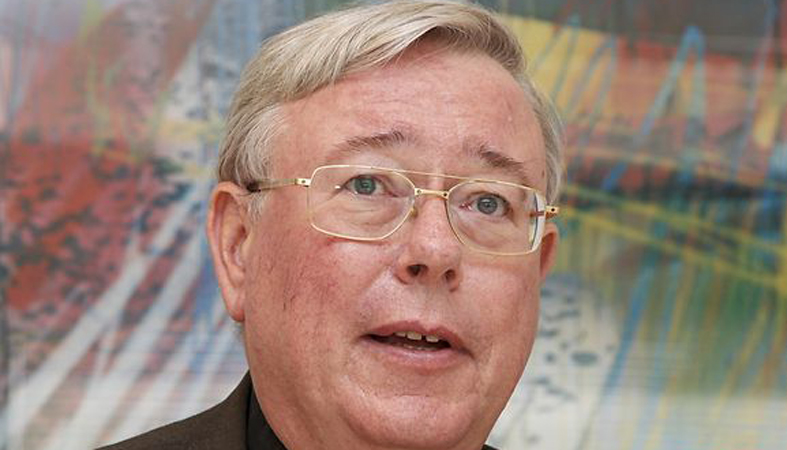
Sr Lola Arrieta, Carmelite Sister of the Caridad...
The text of Sr. Lola Arrieta, Carmelite Sister of the Caridad de Vedruna, expert in...
0 +41 71 227 6040
+41 71 227 6040
 ccee@ccee.eu
ccee@ccee.eu

ACCOMPANIMENT OF A PERSON THROUGHOUT LIFE
My task in introducing the accompaniment of persons from birth to death is both easy and very complicated at the same time. It is easy because the mission of the Church for such an accompaniment is self-evident …. So the difficult task lies on giving a framework and showing some new aspect in this regard. I would like to speak out of my experience having worked at Sophia University in Japan where I had the chance of being a priest with students, professors, employees, alumni etc.
Allow me to quote the Spiritual Exercises of Saint Ignatius at the beginning: the first preamble of the first contemplation of the second week: “to remember the story I have to contemplate: Here, the three divine Persons looking over the whole universe, filled with people. And seeing all of them descending into Hell, they decide in their eternity that the Second Person should become man in order to save mankind.”
This is the mission the Church shares with Christ; help that people be saved. As a bishop, a priest or a lay person, I have to work for the salvation of the people we meet and God makes us to meet.
Let me start my narration with the struggle for life. One of our students got pregnant ….. the family wanted the young woman to have an abortion. In many conversations we could convince the student to keep the baby; this was not only my work, but a common work with all of her friends … community work … later on I could become godfather of the son who got born. Caring for life at the beginning sometimes means caring for the unborn life …
I had the chance of baptizing every year some of my students. With time I noticed that a good number of them had been in a catholic kindergarden, originally fourded by nuns of different congregations but now very often under the care of devoted lay women. They used to sing some catholic hymns like “Mariasama no kokoro” … “the heart of Lady Mary” … they experienced that song as an expression of great piety. They learned to make their heart silent and speak with Jesus. As young students they still had a longing for this original piety and they got curious about God and Christianity.
How often could I meet with parents and appreciate their love for their children … the values they have transmitted not so much through words but through daily family life. How could I have spoken to my students about God being a father without the love of their families. If we look back to our own stories of faith we very often have to go back to our families.
What a joy introducing the little ones to Holy Communion … to see how children can grasp a mystery … how the little hearts can be filled with big love and devotion …
The difficulties to keep faith in puberty … when the ego is in revolt against any kind of authority including religious authority … what a pleasure to have priests who can be friends … who can understand the revolt without sharing it.
I shall not speak about youth … there will be other occasions in this meeting …
Marriage … what a wonderful step to true love. The marriage preparation team in our St Ignatius Parish was composed by priests, nuns, married couples … who could share their own married life … as a priest I was clearly at the learning side … the whole joy of preparing the wedding ceremony. I must inform you about a Japanese particularity: a Church blessing for non-christian couples … It is a good example that our pastoral care has to be for Christians as well as for non-christians … to be missioned for the salvation of the people who cross our path.
Let me introduce the pastoral care for our former students. In Japan there are many group for women … men are more often absent in our Churches in Japan because they have to work, and on Sunday they have to sleep … otherwise they cannot survive. One parish priest had the fantastic idea of opening a bar in Shinjuku where men, tired of their work, can come late in the evening to have a drink … and to be able to speak with this priest … speaking about their frustration at work. From my own experience I can relate that conversations with men in between 30 and 50 years of age which included topics like couple problems … no sexual intercourse anymore because of their tiredness after work … their feeling estranged from their wife … not having much time for real communication … their frustration of having no time for their children, their temptations of suicide … so many white collar workers who really belong to the poorest of the poor.
And after retirement the difficulty of having to form again a family … the feeling of uselessness.
When serious illness threatens: help people to face death … be at the side of the persons in their loneliness of old age and death.
In my diocese I sometimes feel that the Church organizes the liturgies or the sacraments … but we lack the pastoral care for people, we lack in humanity … in brotherly love. If we consider that the Second Person of the Holy Trinity became man for the salvation of people … do we not need to become more human in order to be more like God …
To accompany human persons means to love them, to give them all of our human affection without depending on their response … to give without taking the freedom away for people … to empower them.
We need a lot of respect for the people we have the chance to accompany. Christ precedes us is in their culture, their life, their heart.
We need a lot of humility … because we know that God does not love us more than them.
We have to help them to go forward in the path of their life which is a path where they are first accompanied by Christ. Faith is a dynamic concept: we have to help people to progress in faith. Here I would like to stress the concept of discernment …. To take the best possible decisions … and every best possible decision is a step to meet the Fountain of all … to accept and to collaborate with our salvation.